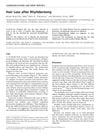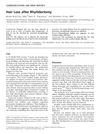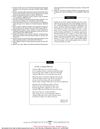 January 2015 in “Springer eBooks”
January 2015 in “Springer eBooks” Hair shedding that lasts more than 6 months may need medical tests, but often just reassurance is enough.
 November 2001 in “CRC Press eBooks”
November 2001 in “CRC Press eBooks” Hair loss from telogen effluvium happens when a disturbance or imbalance causes hair to fall out prematurely.
 January 2023 in “Springer eBooks”
January 2023 in “Springer eBooks” Hair shedding that lasts over 6 months may need a closer look, but often just reassurance is enough.
[object Object]  24 citations,
August 2020 in “AJGP”
24 citations,
August 2020 in “AJGP” A woman's sudden hair loss was linked to her previous COVID-19 infection.
 13 citations,
July 2019 in “Toxicology research”
13 citations,
July 2019 in “Toxicology research” Ethanamizuril is safe for rats at 20 mg/kg feed, but higher doses cause hair loss, organ changes, and liver, kidney, and lung damage.
 43 citations,
May 2011 in “Dermatologic Therapy”
43 citations,
May 2011 in “Dermatologic Therapy” Recognizing the different stages of alopecia areata is crucial for accurate diagnosis and treatment.
 33 citations,
September 2012 in “Australasian Journal of Dermatology”
33 citations,
September 2012 in “Australasian Journal of Dermatology” Chemotherapy can cause hair changes similar to alopecia areata, which might lead to misdiagnosis.
 32 citations,
July 2017 in “Wiley Interdisciplinary Reviews-Developmental Biology”
32 citations,
July 2017 in “Wiley Interdisciplinary Reviews-Developmental Biology” Transit-amplifying cells are crucial for tissue repair and can contribute to cancer when they malfunction.
 June 2023 in “GALENICAL Jurnal Kedokteran dan Kesehatan Mahasiswa Malikussaleh”
June 2023 in “GALENICAL Jurnal Kedokteran dan Kesehatan Mahasiswa Malikussaleh” Telogen effluvium is a form of hair loss caused by various factors and requires identifying the cause for proper treatment.

Cinchona succirubra extract with caffeine reduces hair loss and strengthens hair.
 July 2018 in “Elsevier eBooks”
July 2018 in “Elsevier eBooks” Telogen Effluvium is a common, usually reversible hair loss condition, often improved by removing the trigger and possibly treated with various products, though their effectiveness is uncertain.

Two nutritional supplements improved hair growth and reduced hair loss in women with hair loss conditions.
October 2019 in “CRC Press eBooks” Retinoids can both cause and treat different hair disorders.
 21 citations,
January 2016 in “Skin appendage disorders”
21 citations,
January 2016 in “Skin appendage disorders” Alfredo Rebora suggested a new, easier way to classify hair loss in Telogen Effluvium, adding a type possibly related to autoimmune diseases.
 6 citations,
June 2004 in “Dermatologic Surgery”
6 citations,
June 2004 in “Dermatologic Surgery” A woman had temporary hair loss after a facelift, which improved on its own within a year.
 January 2023 in “Social Science Research Network”
January 2023 in “Social Science Research Network” The document doesn't say if the treatment for hair loss worked.
 106 citations,
July 2013 in “Advances in wound care”
106 citations,
July 2013 in “Advances in wound care” UV radiation can help sterilize wounds and promote healing but requires careful use to avoid damaging cells.
 April 2024 in “Dermatovenerologiâ, kosmetologiâ”
April 2024 in “Dermatovenerologiâ, kosmetologiâ” Telogen effluvium is a common hair loss condition that can be managed with proper treatment and addressing underlying issues.
 July 2004 in “Dermatologic Surgery”
July 2004 in “Dermatologic Surgery” A woman had temporary hair loss due to a stress-related condition after a facelift.
 December 2002 in “Archives of Dermatology”
December 2002 in “Archives of Dermatology” The poem ends by asking for case reports on serious health issues like Telogen Effluvium.
 132 citations,
July 2000 in “Lupus”
132 citations,
July 2000 in “Lupus” In Italian patients with lupus, the most common skin issue was chronic cutaneous lupus, especially discoid lesions, and nonspecific skin problems occurred in about a third of those with systemic lupus, mainly during active disease.
 35 citations,
August 2001 in “Journal of Cutaneous Medicine and Surgery”
35 citations,
August 2001 in “Journal of Cutaneous Medicine and Surgery” Tacrolimus is effective for various skin conditions with fewer side effects than cyclosporine.
 32 citations,
December 1969 in “The Lancet”
32 citations,
December 1969 in “The Lancet” Children with marasmus have more resting hair follicles and thinner, less pigmented hair, showing long-term malnutrition.
 28 citations,
January 2007 in “Dermatology”
28 citations,
January 2007 in “Dermatology” Chemotherapy can cause rapid, extensive hair loss, with patterns varying between individuals.
 18 citations,
March 2016 in “Cosmetics”
18 citations,
March 2016 in “Cosmetics” Telogen Effluvium is a condition causing excessive hair loss due to stress, illness, drugs, or hormonal changes, and can be treated with specific products or naturally resolves after 3-4 years.
1 citations,
April 1986 in “The Journal of Dermatology” Plant worm extract speeds up hair growth in mice without side effects.
 December 2021 in “Trichology and cosmetology:”
December 2021 in “Trichology and cosmetology:” Taking Kera-Diet® improves hair and nail health without side effects.
October 2015 in “CRC Press eBooks” Scalp biopsy and digital phototrichogram help diagnose and manage different types of diffuse hair loss.

A woman had temporary hair loss due to stress from a spinal cord injury.
[object Object]  45 citations,
January 2008 in “Drugs”
45 citations,
January 2008 in “Drugs” Dutasteride effectively treats enlarged prostate, reduces prostate cancer risk, and promotes hair regrowth with few side effects.



























